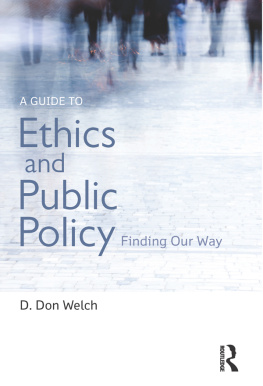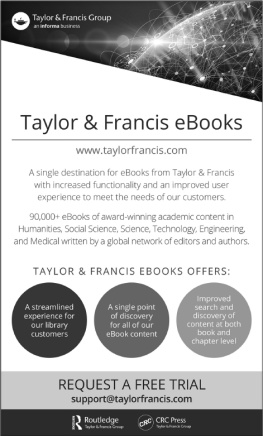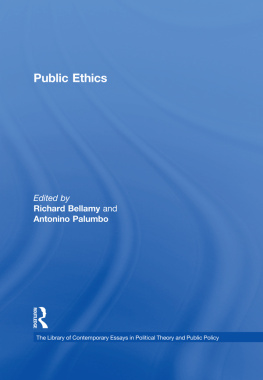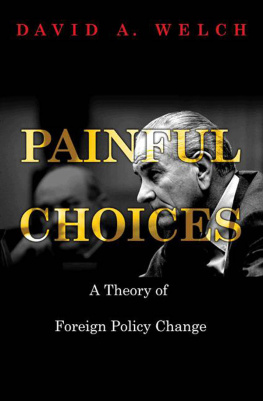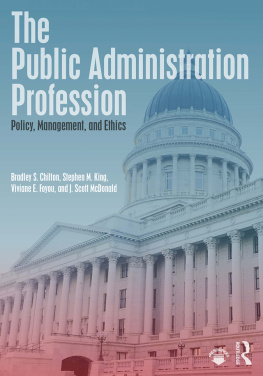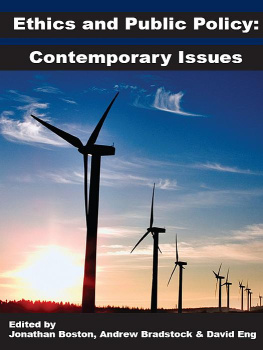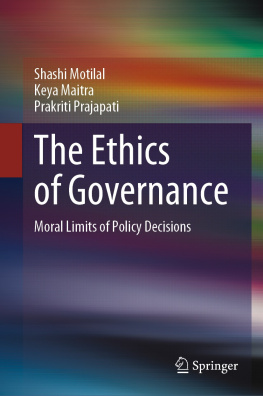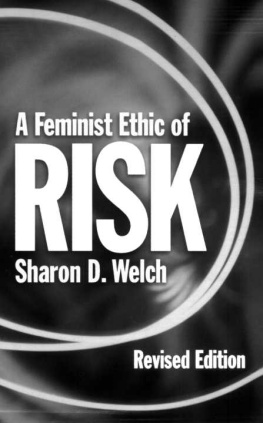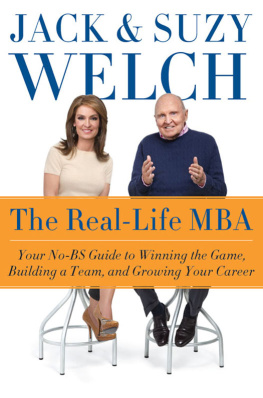A Guide to Ethics and Public Policy
Developed by D. Don Welch during his 28 years of teaching ethics and public policy, the rationale behind A Guide to Ethics and Public Policy is to present a comprehensive guide for making policy judgments.
Rather than present specific cases that raise moral issues or discuss the role a few concepts play in the moral analysis of policy, this book instead provides a broad framework for the moral evaluation of public policies and policy proposals. This framework is organized around five guiding principles: benefit, effectiveness, fairness, fidelity, and legitimacy. These principles identify the factors that should be taken into account and the issues that should be addressed as citizens deal with the question of what the United States government, or any other governing body, should do. Organized by concept, with illustrations and examples frequently interspersed, the book covers both theory and specific issues.
A Guide to Ethics and Public Policy outlines a comprehensive ethical framework, provides content to the meaning of the five principles that comprise that framework through the use of illustrations and examples, and offers guidance about how to navigate ones way through the conflicts and dilemmas that inevitably result from a serious effort to analyze policies.
D. Don Welch was Associate Dean and Professor of Law and Religion at Vanderbilt University from 1984 to 2012. His book grows out of a career divided between law and ethics, especially in the experiences of 28 years of teaching law students, followed by service on the staff of St. Augustines Chapel at Vanderbilt.
First published 2014
by Routledge
711 Third Avenue, New York, NY 10017
and by Routledge
2 Park Square, Milton Park, Abingdon, Oxon OX14 4RN
Routledge is an imprint of the Taylor & Francis Group, an informa business
2014 Taylor & Francis
The right of D. Don Welch to be identified as author of this work has been asserted by him in accordance with sections 77 and 78 of the Copyright, Designs and Patents Act 1988.
All rights reserved. No part of this book may be reprinted or reproduced or utilised in any form or by any electronic, mechanical, or other means, now known or hereafter invented, including photocopying and recording, or in any information storage or retrieval system, without permission in writing from the publishers.
Trademark notice: Producte or corporate names may be trademarks or registered trademarks, and are used only for identification and explanation without intent to infringe.
Library of Congress Cataloging in Publication Data
Welch, Don, 1947-
A guide to ethics and public policy : finding our way / D. Don Welch.
pages cm
1. Public administrationUnited StatesMoral and ethical aspects. 2. United StatesPolitics and governmentMoral and ethical aspects. 3. Political ethicsUnited States. I. Title.
JF1525.E8W43 2014
ISBN: 978-1-138-01377-3 (hbk)
ISBN: 978-1-138-01379-7 (pbk)
ISBN: 978-1-315-79509-6 (ebk)
Typeset in Bembo
by RefineCatch Limited, Bungay, Suffolk, UK
To Les and Jordan
who make me think
Contents
I must acknowledge the teachers who introduced me to the study of ethics: Dan McGee, James Sellers and Howard Harrod. I chose my career path in the hope that I could, in some small measure, do for others what these teachers did for me. I also acknowledge a debt to Amy Gutmann and Dennis Thompson, neither of whom I have ever met. Teaching out of their Ethics and Politics book through four editions was a continually enlightening experience, and inspired me to try to find all the pieces of the puzzle.
I value the contributions of the students I taught for 28 years at Vanderbilt Law School. Many of them were subjected to early drafts of the manuscript that eventually became this book. I suspect that I learned more from them than they learned from me. The friends and colleagues who read early versions, offered advice, and pointed me in constructive directions include Taylor Wray, Doug Knight, Jim Doramus and James Gooch.
My colleagues at Routledge PressMichael Kerns, Darcy Bullock, John Clarke, Eileen Power and Heather Cushingwere unfailing in their professionalism and paved the way to this finished product.
My greatest thanks goes to Celeste. Without her unswerving support and encouragement this book would never have seen the light of day.
We hold these truths to be self-evident, that all men are created equal, that they are endowed by their Creator with certain unalienable rights, that among these are Life, Liberty, and the pursuit of Happiness. That to secure these rights, Governments are instituted among Men, deriving their just powers from the consent of the governed.
United States Declaration of Independence
We the People of the United States, in Order to form a more perfect Union, establish Justice, insure domestic Tranquility, provide for the common defence, promote the general Welfare, and secure the Blessings of Liberty to ourselves and our Posterity, do ordain and establish this Constitution for the United States of America.
Constitution of the United States of America
It is for us the living, rather, to be dedicated here to the unfinished work which they who fought here have thus far so nobly advanced. It is rather for us to be here dedicated to the great task remaining before usthat from these honored dead we take increased devotion to that cause for which they gave the last full measure of devotionthat we here highly resolve that these dead shall not have died in vainthat this nation, under God, shall have a new birth of freedomand that government of the people, by the people, for the people, shall not perish from the earth.
Abraham Lincoln, Gettysburg Address
If you think that all of the good arguments in any public policy debate are on your side, you probably havent thought enough. This book presents a framework for thinking about public policythinking deeply and broadly and carefully. What should the government do about terrorism, health care, education, unemployment, deficit spending, energy independence, climate change, and a host of other issues? Serious efforts to figure out answers to such questions encounter mountains of data, unknowable futures, with one complexity piled on top of another. When we look for guidance, the path is often cluttered with dueling experts and bombastic media stars who are more interested in generating heat than in shedding light.
In such a world, it is not surprising when citizens retreat to simplifying slogans and knee-jerk ideologies. The purpose of this book is to provide an alternative, to offer a framework for answering questions about what our government ought to do. The conclusions we reach about what our government should do are fundamentally moral choices. Many of our public policy debates are so contentious, and seemingly without end, because important and conflicting moral values can be found on all sides of virtually any public policy discussion. This reality should not induce paralysis, but should prod us to extend ourselves, to reach beyond readily apparent or comfortable solutions.
In the public policy world, we do not have the option of refusing to make a decision. When we choose not to decide we are, in reality, making a choice in favor of the status quo. Sometimes choosing the status quo is appropriate. After all, the present situation is the result of prior choices, and surely many of those prior choices were good ones. But when the status quo is affirmed, that affirmation should be given intentionally and deliberately, and not because we lack the energy, initiative or compassion to attempt an improvement.

